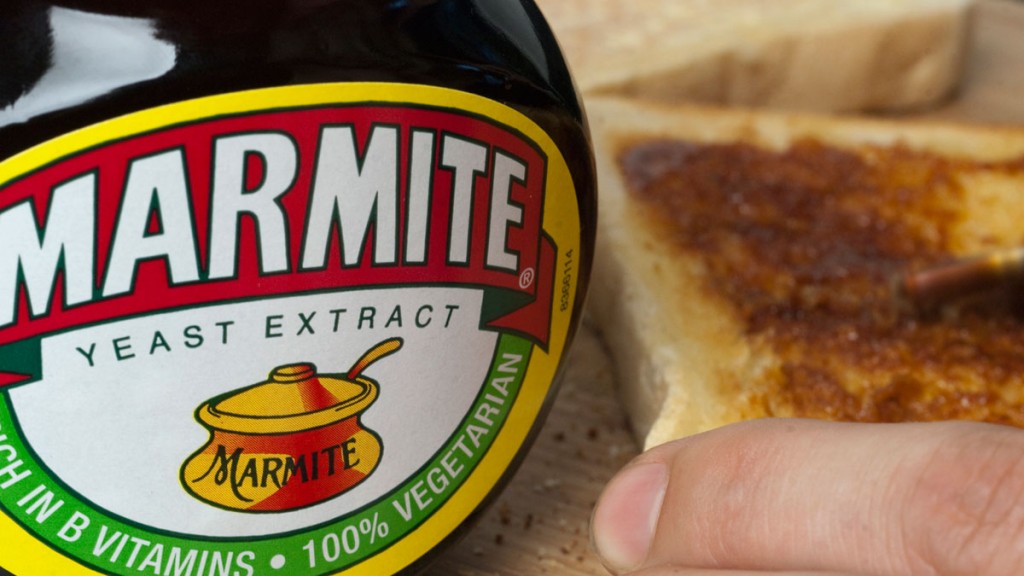
I was all ready to reel out some laboured Marmite metaphor this morning.
This tar-like side effect of the beer brewing process comes in jars and you can spread it on your toast. It’s also at the centre of the latest Brexit controversy, as we’ll get to in a moment.
You love Marmite or you hate it – or so the marketing slogan goes. (Personally I’m indifferent, but I’m probably just being awkward). I immediately thought: “Ah, the irony. It’s just like the Brexit vote and the European Union.”
Then it occurred to me that the EU is actually nothing like Marmite. Yes, some people hate it with a passion. But no one really loves it.
“The EU: you’ll hate it, or you’ll tolerate its undeniable shortcomings because you have too many other things in your busy life to worry about.”
It’s not the world’s best slogan.
So we’ll skip the painful metaphor-ising and just cut straight to the point – who’s going to pay for the higher bills that the weak pound implies?
Tesco gets to play David for once
Tesco and Unilever are having a bust-up. Unilever – which makes the aforementioned Marmite, as well as PG Tips and Persil – has told Tesco that it has to accept a 10% rise in costs. As Matthew Vincent notes in the FT, the price rises have been demanded to “offset the higher cost of imported commodities”.
Tesco, which is more accustomed to dictating terms to its suppliers rather than being dictated to, has told Unilever to take a hike. The supermarket giant has no intention of raising prices when it’s only just starting to turn the business around after years of neglect.
How are you going to compete with Aldi and Lidl if you have to increase your shelf prices by 10% overnight? And how are you going to keep your shareholders happy if you have to swallow that sort of jump in costs?
As a result, warns The Daily Telegraph, some supermarket shelves now face being bereft of such much-loved staples such as Pot Noodle and Ben & Jerry’s ice cream.
Shares in both companies have fallen this morning. On the one hand, Tesco can try to turn this into a patriotism thing – where it’s standing up for the rights of British shoppers against the high-handed arrogance of an evil euro-multinational (Tesco doesn’t get to play David in the Goliath story very often, so this must be appealing).
Indeed, the fact that the battle has hit the headlines suggests there might be a bit of this going on. When it comes to positive PR, every little helps, and all that.
On the other hand, Unilever is bigger than Tesco, has a load of other supermarket customers that might not be quite as willing to fight the good fight, and also has a lot of brand power. And that’s without wondering what happens when the other big consumer goods companies start to pass their costs down the line.
At the end of the day, though, this specific battle isn’t that important. What is more important is this: the slide in sterling is going to take a bite out of someone’s pocket.
The supermarkets can pay by keeping prices the same while shelling out more to suppliers. The suppliers can pay by swallowing cost increases themselves. Or the consumer ends up paying through inflation.
Price wars, over-capacity, and bitter competition should help to keep supermarket costs from rising too aggressively. But I can’t imagine all of those extra costs being swallowed – there will eventually be some pass-through into consumer prices.
That suggests that tougher times lie ahead for retailers. Even if they get to pass on all of their higher costs, if customers have less money in their pockets because they’re paying more for their goods, then competition will only get tougher.
A land of opportunity
However, in economics and investment it’s always important to pay attention to the “unseen” as well as the highly visible. And in this case, for every more expensive jar of Marmite, there’s another sector that will benefit from the sliding pound.
The Bank of England has spent the last eight years hoping to get inflation back into the economy. This might be the chance.
The government spent most of its last term talking about “the march of the makers” and spreading the wealth out of London and into the rest of the country. The weaker pound – assuming it lasts – will help with that.
Britain is a microcosm of the wider world since the financial crisis. Everyone wants change. Everyone wants a new economic model. They might not know exactly how they want that to look, but they don’t want to go back to finance ruling the roost at the expense of everyone else.
This is part of that process of moving to a different model. There will be ups and downs, but while some of the old guard will suffer, there will be huge opportunities for companies in other sectors.
I’ve talked about this in a lot more detail and taken a look at some of the other potential effects of the sliding pound in the latest issue of MoneyWeek magazine, out tomorrow. If you’re not already a subscriber, you should sign up now.